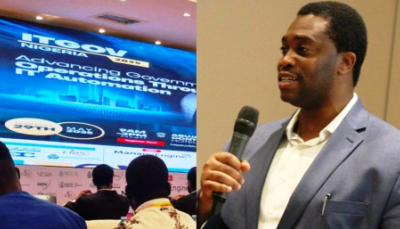MNP will empower consumers on choice
Mr. Tony Ojobo is the Director of Public Affairs at the Nigerian Communications Commission (NCC). Inside the Commission’s office in Abuja, he spoke on Mobile Number Portability (MNP), quality of telecom services and the new interconnect rate with eT Edge News magazine, SEGUN ORUAME, MARTIN EKPEKE, and MOSHOOD ABUBAKAR.
Last year, the NCC applied serious sanction on operators. Between last year and now, the service has not really improved. The KPIs set by the NCC are still there. Does it mean the NCC is not too keen in applying punitive measures again?
We have! Even last month, MTN was fined for failing to meet one of the indicators, and that is the CSR, they didn’t meet that and they were fined. I wouldn’t say we have not gotten to the ultimate KPIs that we have set for the industry especially with regards to quality of service, but we are progressively working towards that. As at last year when the service providers were sanctioned, they sought to have a meeting with the commission, the objective of that meeting was to see whether the commission could look again at the parameters in the quality of service guidelines because they talked about some peculiarities in our environment that will probably hamper their ability to meet the ultimate KPIs, and also cited some countries that have similar challenges that Nigeria has, indicating that some of our KPIs were highest than some of those countries, that we should look at it again because it is not something they can meet immediately. So we agreed with them to re-jig some of the indicators. But of course, without any resort to what is already gazetted in the quality of service guidelines. We agreed that we can give slightly below what it is but by December 2013, we should be able to achieve what is called standard KPI. Now, the challenges are still there because some of the factors that caused the challenges are still there. Maybe if you mitigate that, you will begin to feel the impact, for instance in the North East even some days back we still have some base stations being destroyed. However, even in taking the measurements, we isolated areas where we had issues with flooding and vandalisation, we took our measurement from those areas. Now those are the areas where MTN didn’t meet one of the indicators. But one of the ways the regulator can treat issues that has to do with quality of service is through the introduction of some regulatory intervention. Now, something like Mobile Number Portability for instance is a regulatory intervention that will deepen competition.
The key issues that affect quality of service are still there. Will number portability help to give satisfaction to the subscribers?
In any service industry, competition is key particularly where the customers have the power of choice. As it is today, subscribers are locked into networks. Whether you are getting the desired quality of service or not you are locked into your network because you have used that particular number through the years, all your business associates, colleagues and friends know you on that particular number, so you wouldn’t want to go take a new SIM and another number that they don’t know you with. So you will rather stick to a number that you have, the number that is on your letter headed paper, on your complimentary card and all of that. With Mobile Number Portability, you have the liberty, there is flexibility in terms of network that you use, and that will put added pressure on the networks to make sure that they get their customers services right. In the telecom industry, it is a game of numbers; your revenue is tied to traffic and traffic is related to numbers. The more subscribers you have on the network, the more likelihood the volume of traffic will climb, and the higher the volume of traffic, the higher the revenue. Now, if you lose numbers, it will affect your revenue and the stakeholders will begin to ask questions, why is it that our revenue is declining? So what you are going to see is that there is going to be stiff competition, and in this competition quality of service is going to be key because that is what the subscribers are looking for. We are supposed to launch on the 25th of March but we now have to extend for another three weeks because of testing that is still going on. I also believed that within these period of time, the networks are also putting finishing touches to their equipment to make sure that by the time the number portability picks up, they will see some improvement in their networks because in other times where they have had competition deepened, a number of factors actually contributed to improving the quality of service; a major factor is mobile number portability because there is a lot of statement that can be made for any network that begins to lose subscribers. It is going to put a lot of pressure on the management; it is going to put a lot of pressure on the board of that network. From the perspective of competition, even as we speak, the issue of quality of service is not the same in all networks. There are some networks we can really consider that they are relatively better than others, so we might see situation where there will be shift in loyalty because what we have now is a forced consumer loyalty, you don’t have a choice, and you are locked in. But once there is number portability, there will be freedom. Once that liberty comes in, there will be a lot of movement within that first quarter.
Why is the NCC auctioning the 2.3 GHz spectrum now and has the commission made up its mind on whom to auction it to?
NCC is still consulting with stakeholders. But of course you know the issue of spectrum, there are a number of things that guide the allocation of spectrum as well as assigning and as well as licensing of spectrum. The underline factor there is equity; how can you allocate spectrum equitably? That is why for instance in 2001, the auction of the digital mobile licence gave everybody a chance. As a regulator, you need to have a level playing field for all investors and stakeholders. Our core value in NCC is 3Fs; fair, firm and forthright. Fairness means creating opportunity for everyone. Now we have gotten some representations from some operators in the industry advocating that the license should be given to them, how do you defend that? In an auction, you allow the entire interested parties bid, and if you bid and you win, it is given to you. The equitable way to allocate spectrum is through auctioning, any other position you take, you are highly subjective and people may have cause to go to court. In an auction, we have a guideline and anyone that meets the guideline will win. If you say let us give to these ISPs because they have gotten the spectrum before and because it is going to increase their capacity or the bandwidth that is available to them, what about other people that are also interested? In my personal view, we are getting to a point where we will begin to get consolidation in the industry. If for instance there are some stakeholders in the industry that feel they have a stake in this, they can come together and bid. But in this part of the world, it is not common for you to see mergers and acquisitions, or business consolidation where you see people coming together to do things. Instead of seeing every small business going into different place, what prevents people from coming together? The issue of whether it should be reserved for some people cannot arise; the only equitable thing to do is let there be a level playing field where every interested party can play.
Are the new interconnect charges operational now. Have the CDMA and GSM operators agreed on same charges?
One of the conditions we have there is, you have new entrants and you have subscribers base for new entrants, we are looking at year zero to three. Those are the ones that will enjoy the N6.40k interconnection rate for this year and then of course with the gliding path up to 2015. But for the big operators; now small operators are those that have less than 7.5% of the subscriber’s base, and then the big operators are those that have above 7.5%. However, if you are a big operator that already has above 7.5%, and for any reason you come below 7.5%, it still will not apply because really it means that something may have gone wrong for you to go below that. It is either you did not do your marketing strategy well or probably you are not providing your subscribers very good services. We see that as inefficiency and we can’t be paying for inefficiency. So once you go above 7.5%, whether you go back or not, you are not qualified for the asymmetric. It is supposed to have taken effect from the first of April but the implication is that the service providers will look at their cost and see how they can tweak it with review to enable their subscribers benefit from reduced data interconnection rate. We believe that it is going to be beneficial to us in the sense that though interconnect rate has come down, what could probably go up is traffic because if prices come down, traffic goes up because a lot more people can make calls and even stay longer, and you can have more minutes generated. What you think you are losing in terms of rate here, you can make up in terms of number and traffic. And again another consideration for the CDMA operators, why it wasn’t a flat rate for both the CDMA operators and the GSM operators is because most of them fall within the category of small operators; most of them have below 7.5% subscriber base. In fact some of them are still losing subscribers even as we talk. From a subscriber’s perspective, it is actually about choice because if somebody is travelling to his village for instance, you will rather go with a phone that will give you access. The CDMA operators are not as productive in terms of access and that in itself has limited the market for them, they have not really defined the market where they can play, which means they are only playing in the cities, and not even all the cities as it were.




























